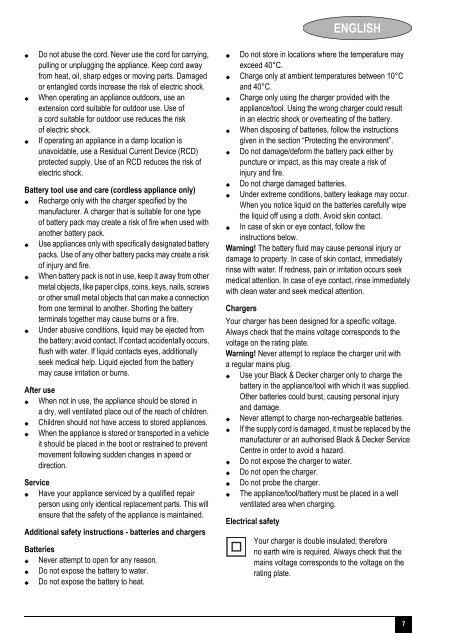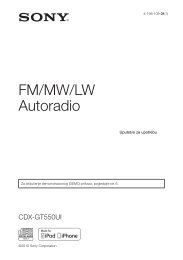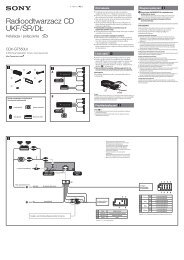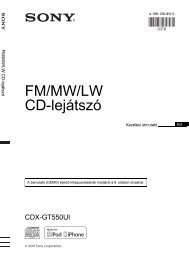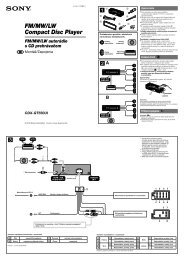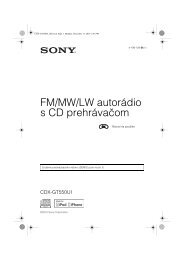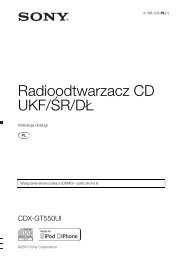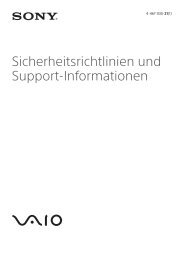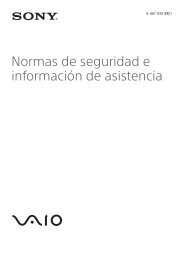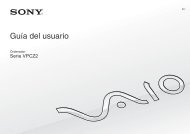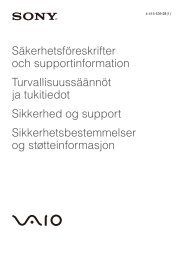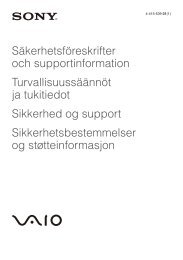BlackandDecker Aspirateur Port S/f- Pv1805 - Type H2 - Instruction Manual (Européen)
BlackandDecker Aspirateur Port S/f- Pv1805 - Type H2 - Instruction Manual (Européen)
BlackandDecker Aspirateur Port S/f- Pv1805 - Type H2 - Instruction Manual (Européen)
You also want an ePaper? Increase the reach of your titles
YUMPU automatically turns print PDFs into web optimized ePapers that Google loves.
ENGLISH<br />
<br />
<br />
<br />
Do not abuse the cord. Never use the cord for carrying,<br />
pulling or unplugging the appliance. Keep cord away<br />
from heat, oil, sharp edges or moving parts. Damaged<br />
or <strong>en</strong>tangled cords increase the risk of electric shock.<br />
Wh<strong>en</strong> operating an appliance outdoors, use an<br />
ext<strong>en</strong>sion cord suitable for outdoor use. Use of<br />
a cord suitable for outdoor use reduces the risk<br />
of electric shock.<br />
If operating an appliance in a damp location is<br />
unavoidable, use a Residual Curr<strong>en</strong>t Device (RCD)<br />
protected supply. Use of an RCD reduces the risk of<br />
electric shock.<br />
Battery tool use and care (cordless appliance only)<br />
Recharge only with the charger specified by the<br />
manufacturer. A charger that is suitable for one type<br />
of battery pack may create a risk of fire wh<strong>en</strong> used with<br />
another battery pack.<br />
Use appliances only with specifically designated battery<br />
packs. Use of any other battery packs may create a risk<br />
of injury and fire.<br />
Wh<strong>en</strong> battery pack is not in use, keep it away from other<br />
metal objects, like paper clips, coins, keys, nails, screws<br />
or other small metal objects that can make a connection<br />
from one terminal to another. Shorting the battery<br />
terminals together may cause burns or a fire.<br />
Under abusive conditions, liquid may be ejected from<br />
the battery; avoid contact. If contact accid<strong>en</strong>tally occurs,<br />
flush with water. If liquid contacts eyes, additionally<br />
seek medical help. Liquid ejected from the battery<br />
may cause irritation or burns.<br />
After use<br />
Wh<strong>en</strong> not in use, the appliance should be stored in<br />
a dry, well v<strong>en</strong>tilated place out of the reach of childr<strong>en</strong>.<br />
Childr<strong>en</strong> should not have access to stored appliances.<br />
Wh<strong>en</strong> the appliance is stored or transported in a vehicle<br />
it should be placed in the boot or restrained to prev<strong>en</strong>t<br />
movem<strong>en</strong>t following sudd<strong>en</strong> changes in speed or<br />
direction.<br />
Service<br />
Have your appliance serviced by a qualified repair<br />
person using only id<strong>en</strong>tical replacem<strong>en</strong>t parts. This will<br />
<strong>en</strong>sure that the safety of the appliance is maintained.<br />
Additional safety instructions - batteries and chargers<br />
Batteries<br />
Never attempt to op<strong>en</strong> for any reason.<br />
Do not expose the battery to water.<br />
Do not expose the battery to heat.<br />
Do not store in locations where the temperature may<br />
exceed 40°C.<br />
Charge only at ambi<strong>en</strong>t temperatures betwe<strong>en</strong> 10°C<br />
and 40°C.<br />
Charge only using the charger provided with the<br />
appliance/tool. Using the wrong charger could result<br />
in an electric shock or overheating of the battery.<br />
Wh<strong>en</strong> disposing of batteries, follow the instructions<br />
giv<strong>en</strong> in the section “Protecting the <strong>en</strong>vironm<strong>en</strong>t”.<br />
Do not damage/deform the battery pack either by<br />
puncture or impact, as this may create a risk of<br />
injury and fire.<br />
Do not charge damaged batteries.<br />
Under extreme conditions, battery leakage may occur.<br />
Wh<strong>en</strong> you notice liquid on the batteries carefully wipe<br />
the liquid off using a cloth. Avoid skin contact.<br />
In case of skin or eye contact, follow the<br />
instructions below.<br />
Warning! The battery fluid may cause personal injury or<br />
damage to property. In case of skin contact, immediately<br />
rinse with water. If redness, pain or irritation occurs seek<br />
medical att<strong>en</strong>tion. In case of eye contact, rinse immediately<br />
with clean water and seek medical att<strong>en</strong>tion.<br />
Chargers<br />
Your charger has be<strong>en</strong> designed for a specific voltage.<br />
Always check that the mains voltage corresponds to the<br />
voltage on the rating plate.<br />
Warning! Never attempt to replace the charger unit with<br />
a regular mains plug.<br />
Use your Black & Decker charger only to charge the<br />
battery in the appliance/tool with which it was supplied.<br />
Other batteries could burst, causing personal injury<br />
and damage.<br />
Never attempt to charge non-rechargeable batteries.<br />
If the supply cord is damaged, it must be replaced by the<br />
manufacturer or an authorised Black & Decker Service<br />
C<strong>en</strong>tre in order to avoid a hazard.<br />
Do not expose the charger to water.<br />
Do not op<strong>en</strong> the charger.<br />
Do not probe the charger.<br />
The appliance/tool/battery must be placed in a well<br />
v<strong>en</strong>tilated area wh<strong>en</strong> charging.<br />
Electrical safety<br />
Your charger is double insulated; therefore<br />
no earth wire is required. Always check that the<br />
mains voltage corresponds to the voltage on the<br />
rating plate.<br />
7


